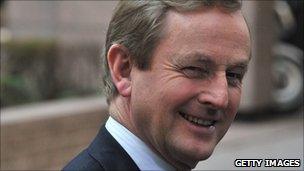Irish banks need extra 24bn euros to survive
- Published
Patrick Honohan, Governor of Ireland's Central Bank announces 24bn euro shortfall
The Republic of Ireland's banks need an extra 24bn euros (£21.2bn) to survive the financial crisis.
The figure follows a stress test on the Irish banking system by a group of independent experts and the country's central bank.
Four lenders were tested - Allied Irish Banks, Bank of Ireland, Educational Building Society (EBS) and the Irish Life & Permanent.
Allied Irish Banks needs most money, and will have to raise 13.5bn euros.
Bank of Ireland needs 5.2bn euros, EBS 1.5bn euros, and Irish Life 4bn euros.
The total amount poured into the Irish banks since the financial crisis will now be close to 70bn euros.
Professor Patrick Honohan, governor of the central bank, said: "The new requirements are needed to restore market confidence, and ensure banks have enough capital to meet even the markets' darkest estimates."
Dublin already owns most of Anglo Irish Bank, Allied Irish Banks and the EBS following previous rescues of the banks.
Mr Honohan said it was likely that, as part of the next infusion of funds, the other two banks to avoid nationalisation - Bank of Ireland and Irish Life & Permanent - would now have be taken into state control.
Money set aside from the 85bn euro EU-IMF bail-out agreed in November will be used to fund the latest recapitalisation.
The banks will be set six-monthly - unpublished - targets to reduce their huge borrowings over the next few years through a process of asset sales.
Mr Honohan said, however, that the banks should be able to avoid 'fire sales' that would cut the amount of money raised from disposals.
Marchel Alexandrovich, European financial economist at Jefferies International, said the results of the stress tests were what the financial markets expected.
"Nevertheless, our initial impression is that the question of whether this is enough will continue to linger," he said.
He also pointed that there was no mention of how to treat the banks' senior bondholders, who fear they may forced to incur greater losses on their loans.
Trading in the banks' shares was suspended for the day pending the stress tests announcement.
The European Central Bank (ECB) had been expected to announce a new 60bn euros medium-term financing arrangement, to provide the Irish banks with a reliable source of cash.
But the announcement, which was due at the same time as the Irish central bank announcement, has now been postponed because of a disagreement among the ECB's governing council, according to a report from news agency Reuters.
Mortgage meltdown
Until now, losses in the Irish banking system have stemmed from the collapse of a speculative bubble in the commercial property sector, where billions were borrowed from the banks to fund hotels and shopping malls.
However, the latest stress tests focused instead on an emerging meltdown in the residential sector.
The stress tests assumed a cumulative collapse in property prices of 62% - a level already reached in some parts of the Republic.
It also assumed the unemployment rate peaking at 14.9%, a projection criticised by some economists as too weak, given that the latest data puts the rate at 14.7% already.
However, the Irish central bank hired US asset manager BlackRock to review this year's stress tests to increase their credibility.
A previous round of tests failed to spot serious problems at the banks shortly before some of them required financial support.
Haircuts
The 70bn euros being poured into the banks is equivalent to almost half of the Irish economy's annual output, or about 17,000 euros per Irish citizen - a burden that the government sees as unacceptable.
The newly-elected Taoiseach, Enda Kenny, has been calling for the banks' lenders to share in the losses, but this is likely to be resisted by other European countries.
In the early stages of the banking crisis in 2009, the government issued a blanket guarantee of its banks' debts.

Newly-elected Taoiseach, Enda Kenny, wants the banks' lenders to take a share of the losses
The Republic's European partners feared a default by Irish banks could trigger a Europe-wide banking crisis.
They insisted that Dublin continue to honour the guarantee as a condition of last year's bail-out - much to the anger of opposition parties that have now taken control of the government.
However, only about 21bn euros of the banks' remaining long-term debts are still covered by the guarantee, according to the Irish Central Bank.
That leaves some 40bn euros of debts that could potentially be given a "haircut", forcing creditors - including UK, US and German banks - to take losses.
As well as the government guarantee and capital injections, the Irish banks have also been the recipient of over 150bn euros of short-term financing from the Irish central bank and the ECB.
- Published30 March 2011
- Published28 March 2011